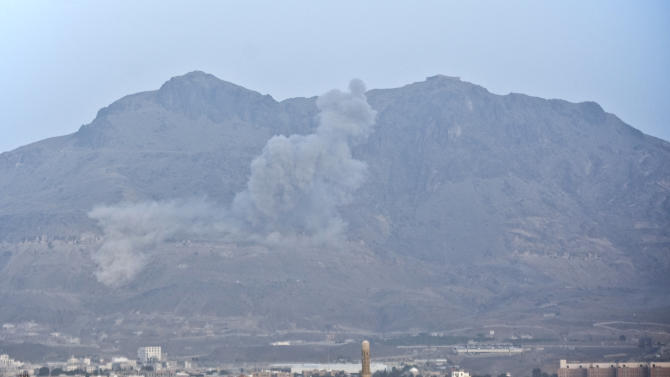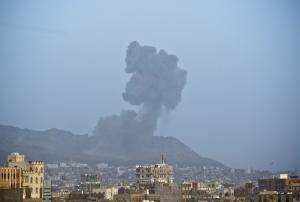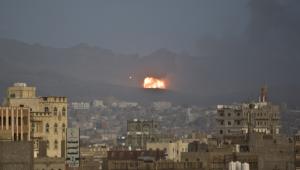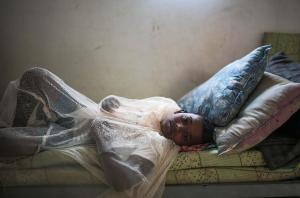Date: Wed, 20 May 2015 00:06:49 +0200
SANAA, Yemen (AP) — The Saudi-led coalition on Tuesday carried out the heaviest airstrikes on the Yemeni capital since a five-day truce with Yemen's Shiite rebels expired earlier this week, hitting weapons depots in the mountains surrounding Sanaa and sending dozens of families fleeing their homes in panic.
The bombardment began shortly after midnight Monday, with airstrikes targeting rebel-held military depots in the mountains of Fag Atan and Noqom, where missiles, tanks and artillery are kept, the residents said. There was no immediate word on casualties.
The Saudi-led coalition has repeatedly struck the two sites since launching the air campaign against the Iranian-backed rebels, known as Houthis, on March 26. But Tuesday's assault was the heaviest since Sunday's expiration of a five-day humanitarian truce, which was repeatedly violated.
By sunset, a fresh wave of airstrikes sent fire and smoke rising from the mountains around the capital, Sanaa. Dozens of families living close to the bombed sites hurriedly loaded their belongings onto vehicles and left in search of safer areas.
Missiles hit several Houthi positions on Tuesday in their strongholds in the northern provinces of Saada and Hajjah, as well as a gathering of fighters allied with the Houthis in the city of Ibb, south of Sanaa. The rebels and their allies were also hit in the western city of Taiz and the southern city of Aden, near its airport, as well as in the eastern province of Marib.
Airstrikes also targeted a house owned by ousted President Ali Abdullah Saleh in the Sanaa suburb of Sanhan, flattening it. Saleh's whereabouts are not known but his loyalists in the country's fragmented army have joined ranks with the Houthis. That alliance paved the way for the rebel takeover of Sanaa last September and boosted the rebels' ability to advance into southern cities in an effort to expand their territorial gains.
Fearing more airstrikes, residents in areas around Saleh's other houses — such as in Sanaa's al-Dajaj district — packed up and left.
"Our house is just next to Saleh's house and most of the people have left. Now the district is like a ghost city," said Fathi al-Udini who also left with his family, fleeing al-Dajaj.
Meanwhile, the Houthis fired Katyusha rockets at the Saudi border region of Najran from their stronghold of Saada on Tuesday, according to tribesmen in the region. Nearby, the adjacent border area of al-Jouf province saw heavy clashes between Houthi fighters and tribesmen believed to be backed and armed by Saudi Arabia. The battles are meant to open a new frontline with Saada to distract the Houthis from shelling Saudi territories, the tribesmen said.
The ground fighting did not stop even during the truce between the Houthis and fighters backing internationally-recognized President Abed-Rabbo Mansour Hadi, now in exile in the Saudi capital of Riyadh.
Houthis and their allies have for weeks been trying to take over Aden, the strategic port city on the Arabian Sea, and the truce has apparently given them time to deploy more troops for that purpose.
A senior military commander in Aden said the rebels and their allies have surrounded the city from three different sides and are now in control of several large sections of Aden. Tens of thousands of civilians have been displaced from the area and pro-Hadi fighters have been given three days to surrender their weapons, he added.
The residents, tribesmen, the commander and all Yemeni officials spoke to The Associated Press on condition of anonymity, fearing reprisals by the Houthis.
The Yemeni conflict has killed 1,820 people and wounded 7,330 since March 19, according to UN estimates. The estimates also show that nearly a half million people at least have been displaced in the period since the beginning of the fighting until May 7.
Also on Tuesday, World Food Program called for "predictable pauses" in the fighting in Yemen to deliver food to conflict zones.
"We are seriously concerned about families out of our reach," said WFP's representative to Yemen, Purnima Kashyap. "We need predictable pauses in fighting to allow us to line up partners on the ground to move food and reach the maximum number of people."
In New York, U.N. officials warned that Yemen's fuel supplies are dwindling fast.
"If the country as a whole runs out of fuel, there's so many things that cannot work, and therefore there needs to be the ability for ships and planes to get into the airports and ports and deliver supplies," said Farhan Haq, deputy spokesman for the U.N. secretary-general.
Yemenis fleeing the conflict have little options and some have crossed the Gulf of Aden and made their way to Djibouti, a tiny nation on the Horn of Africa. According to the U.N. refugee agency, at least 1,000 Yemenis have arrived in Obock, in northern Djibouti, since the beginning of airstrikes. At least 3,000 others have arrived in Djibouti city, the UNHCR has said.
In a show of support to the Saudi-led operation, a gathering of dozens of Yemeni politicians and tribal figures ended in Riyadh on Tuesday with a declaration that called for the formation of special forces to protect Yemen's cities engulfed in the fighting.
The declaration also called for the formation of "safe zones" where "legitimate" Yemeni institutions could operate, though it gave no clear plan on how to set up such special forces or who would be responsible for the safe zones.
From the start, the Saudi-led airstrikes were expected to be followed by a ground operation but almost two months into the campaign, there has been no sign of any such ground forces.
___
Associated Press Writer Cara Anna contributed to this report from the United Nations.




